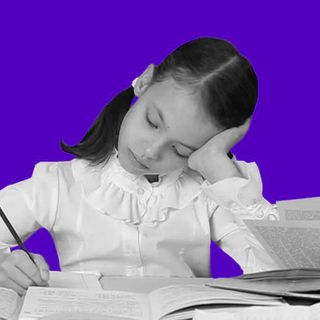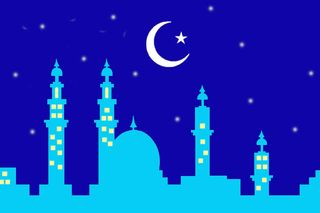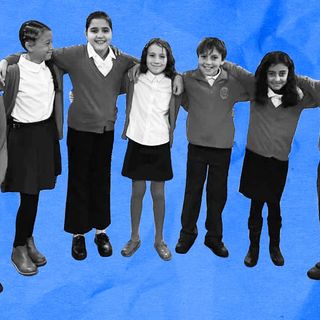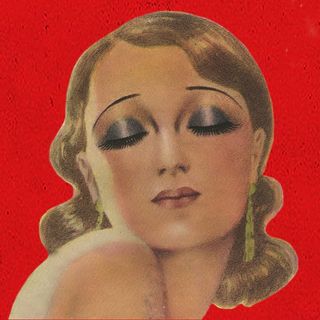
Two Generations Discuss Their Family Histories of Ramzan
Technology and distance are changing the festival.

As Ramzan begins, The Swaddle spoke to two generations from two different Mumbai families to learn what the festival means to each, and how it has changed over the years.
THE SWADDLE: What does Ramzan and Eid mean to you? What do you look forward to?
Aldish Edroos, 27: To me it used to mean happy times, because it was one of the first festivals I came to recognize when I was a child, and there was a lot of fanfare around it because a week before they would start planning, my mother and father, what to do.
Hina Edroos, 55: I am a new Muslim. [Ed. note: Hina adopted her husband’s religion after marriage.] So, initially, for me, Eid was a day when you make biryani and kheer. But later on as I came to know the meaning of it, the importance of it, now there is an attachment to Ramzan, the festival. You don’t eat food for the entire day, and when you get little bit to eat you’re very happy. You know it’s a celebration for you.
Jumana Mahimwala’s Mother, 52: It’s a phase of fasting, to flashback, to think of how the whole year has passed. You’re trying to find out things about yourself, and all the other things, like religious prayers.
Jumana Mahimwala, 29: The one thing I personally look forward to is meeting my family and friends. You know there are some times that you don’t meet people for an entire year and you realize, “Oh shit I haven’t met this person!” I meet them on the occasion of Eid. There are family gatherings, and you get to meet extended family, you get to chill with people and stuff. And, yes, the famous biryani.
JM’s Mother, 52: Basically now as I get older, I feel I might not be able to go meet people, but when they come to meet me I feel happy. And in Ramzan, because we go to the mosque, we tend to meet more people over there. Sometimes there are new people, so you make new friends also.
JM, 29: See basically if you’re going for the textbook definition, it is a month of fasting not just food, but you’re kind of giving up other things also, to prayer and to god. Eid is the culmination of that, when you’re celebrating the completion of your 30 fasts.
Personally for me, it is like a break from the world kind of a thing. Normally, we have a daily routine — like every day you get up in the morning, your breakfast, your household chores, and you go about your day as normal or whatever. This is what happens in my family, in my household.
But we have a different routine for Ramzan. It’s like a break from the rest of the world. I become a lot less active on social media, a lot of my TV time gets cut down. Anyway, I’m not a very WhastApp-y and Facebook person nowadays. So, it’s not much of a break really, but it’s just that little detoxification.
And Eid is basically like: Start the [normal] routine again.
THE SWADDLE: How does your routine change during Ramzan and Eid? What are your rituals and traditions?
AE, 27: I’m a lapsed Muslim, if anything. I think one of the things I’m very grateful to my mother and my father is that they said our religion is our own business. It is the most personal thing we have, no one should interfere in it, not even your parents. But the one thing that my father was very staunch about was the iftar. I mean, regardless of who is fasting, who is not, or if no one is fasting, the evening iftar had to happen in the house.
It needed to happen because that was, he used to tell me, when angels come to the house, and when they come, they expect food because they have been fasting too. I mean that’s obviously not true, but this is what he told me as a child. If they don’t see food on your table then they’ll go back hungry and that’s not nice. So that’s what we did. We were four people, but he would always keep six of seven dates for the angels. If you’re outside the house during that time then, okay, you don’t have to do it. But try and come back before iftar, and if you do you must participate.
HE, 55: First, we would look for the moon. We would call each other, “Aunty, aapko chaand dikha kya?” Other people who were in Muslim localities would know better. Now on TV we know; now it comes on WhatsApp. Before, my children would run to the terrace to see if they can really see the moon. If they could they would call us.
Then we would read a small dua. And in the morning my husband and son would go to masjid. Then we would give money to poor people. (You have to give this when you see the moon and before morning Eid namaz.)
I would get up and get ready, and make kheer first. When they returned we would wish each other Eid Mubarak, they would give some gifts. We would then have kheer. Later, I used to make biryani and kebabs, whatever dishes you want to make. Then there would be guests.
AE, 27: Biryani was my most favorite part of the festival. My mother would cut at least half a kilo of onions and tomatoes and chop it and keep it. Then she would see if the meat was marinated properly. And the vegetables cut. So that was quite cool to see her do all that when I was little. As we grew older, my brother and I would invite our friends or we would ask my mom to make more biryani to take for our friends. Eventually, my mother would have to diversify and make veg biryani for my vegetarian friends.
HE, 55: One year, there were 18 people who came for lunch. My two brothers-in-law and their families were visiting. Then eight of my son’s friends, decided to give him a surprise. I didn’t know what to do about it. It was hectic, but it was fun. His friends started helping me cook more food. They took the onions and chopped and cut vegetables. It was memorable, how everybody had come together and we made the meal. In the meantime, they were all eating kheer while we made the biryani. And ultimately, the biryani hardly anybody ate because they were all full.
JM, 29: Our day begins at 4:30-5 o’clock. An hour and an half before sunrise, you have to complete your sehri — sehri is what you have before your fast. Then once that time gets over, you can’t eat, you can’t drink, you can’t do anything. And you have to pray, of course. Just before sunrise, there’s a time for that also. Usually I go off to sleep after that and I wake about 8-8.30.
I’m living in a joint family, there are eight of us, including the kids. So we are only cooking for the three kids during the day, because the rest of us are fasting. Little kitchen work is done, then we play the Kuran, we play other things, then we have prayer beads, we do that.
JM’s mother, 52: At noon we pray, and then the whole day goes in prayers. In evening we try and prepare something to break our fast at sunset. Then again night prayers, and some people do get up in the middle of the night to pray. At midnight and all. It’s basically just prayers. Try to pray as much as we want to pray.
JM, 29: The traditions, the rituals, the ceremonies everything is more or less the same. The head priest, he does the prayers in one mosque and then they have a relay of it everywhere. When we were younger, it wasn’t so advanced, so it was the audio relay. Now, it’s become video. So, not everyone can go that mosque to pray. It’s an online lottery system because there are too many people. But, we can see it happening live.
THE SWADDLE: Has technology changed the festival much?
JM, 29: It’s not really changed, it’s just become easier with technology and innovation. Earlier, we used to have to carry these heavy books with prayers, now everything is on the mobile in PDF format. Also in Eid earlier, everyone used to call up saying “Eid Mubarak! Eid Mubarak!” Now it’s all on WhatsApp. I don’t know how much of a boon that really is. Being bombarded with WhatsApps from everyone, from everywhere.
AE, 27: There used to be a police station near our house in Alibaug. So every evening at sunset they would have the bugle sound, and they would have a flag de-hoisting ceremony. So that’s when we knew it was sunset. But later on, I checked on the Internet. I would sit with the computer with the food and everything, and then I would be like, “Oh, now it’s time, now I can eat.” Then my mother has this app now, which is the Kuran app or something. All through Ramzan she will have the Kuran playing in one corner of the house. It keeps going. And I’m wondering where is this maulana in the house.
When my father was ill, he couldn’t do much. There’s an app that has these duas spoken out loud, so if you have the intention to say the dua but you can’t, you also get the sabab (the attainment).
JM’s Mother, 52: Yes, of course, we can message people, we can talk we can Internet chat. Some people are far abroad, we haven’t met them, but this way we can talk to them. In a way it has made us closer.
HE, 55: Now with technology, if you can’t go, you use Facetime or make a call. That personal touch is not there now. Technology has helped us, also it has been a curse. Many times people choose to use Facetime, like, “Sorry we can’t come, so we are wishing on Facetime.” Even though people are connected, people are disconnected.
THE SWADDLE: Has that dimmed the togetherness aspect of the festival?
JM’s Mother, 52: Yes of course. It’s become a little bit subdued also. Now, families have also become smaller; earlier we had huge families, there were a lot of people to meet. Now, people are all over the world.
HE, 55: I told my daughter either you come on 15th or 16th this year, or either I’ll come. So she said, “What is the point in spending Rs. 10,000-12,000. Over there you will make food, over here you’ll make food as well. I’ll make something here, don’t bother.” That practicality has come into life. She is right, just to celebrate it, you’ll spend 12k on flight tickets. Practically speaking, she’s absolutely right. But, I still feel things have changed, the distance has come in between, and the distance in relations, also.
THE SWADDLE: Has anything else changed the way you celebrate the festival?
HE, 55: For me it has changed drastically. The reason being that first my daughter was around. Then my son got married, to a girl of another community. Now in his house he doesn’t do anything. Because honestly, both my kids are atheists. Aldish doesn’t believe at all, and he doesn’t either. And Eid is just another lunch at mother’s house.
I thought that maybe if we let them be free, let them choose their own things, but I was wrong there. I was trying to be cool about it you know with my children. Like they will understand, but no it backfired on me. For them it’s just another day.
JM, 29: This concept of going to the masjid for namaz in Ramzan started getting a lot more popular 15 to 20 years ago. Earlier everything was at home, you could call anyone you wanted to your house.
JM’s Mother, 52: It’s not been the same, but now in our Dawoodi Bohra community, that concept of holding an iftar and inviting too many people — slowly people are not doing that too much. We prefer to go to the mosque and do it in the mosque with our community. And people have become health conscious also. So that food wastage and all that is cut down. We are very conscious about what we eating. First it was fasting and feasting, now it’s more fasting and sensible eating.
HE, 55: Earlier, families from different communities would visit us. For Eid, they would think “we have to go there” about my house. Initially, it used to be the whole family visiting. Then after the 1993 riots people became wary. Even my neighbors, I used to give them biryani every Eid. Then later they started getting reluctant. So we gradually stopped the tradition.
After the riots the entire generation was spoilt. And that time children were able to understand she is a Hindu or he is a Muslim. My daughter suffered a lot when she was in school. There were very few Muslims. And everyone called her a Pakistani. She didn’t have many friends in school. So this Hindu Muslim started coming with them.
Now your generation realizes that it is a political game. Now you have become friendly. Now with this new generation friends have started coming and all. So, things are changing now, and that’s really good.
AE, 27: College was the first time I actually made Muslim friends, because there weren’t many Muslims in my school. It inculcated a sense of sisterhood and fraternity. It felt like, okay cool, I have other people who follow similar things and do similar things and that felt good. That’s how it changed. It became more democratic in that sense, more inclusive as I grew up. When I was smaller it was only a little festival that we would follow. That no one else knew.
Religion as such does not hold a lot of ideological value for me, but it does hold a lot of sentimental and cultural value. Now Eid is more of a sober version of what we used to do. Mum will still make biryani, my brother will come from his home, and we will wish each other. Shopping for new clothes is not an occasion any more. We would just chill, and he would go after he’s done with his lunch. And that’s it. It would be a normal day.
These interviews have been condensed and edited for clarity. As told to Angelina Shah.
Related


Why Are School Uniforms Still Gendered?
